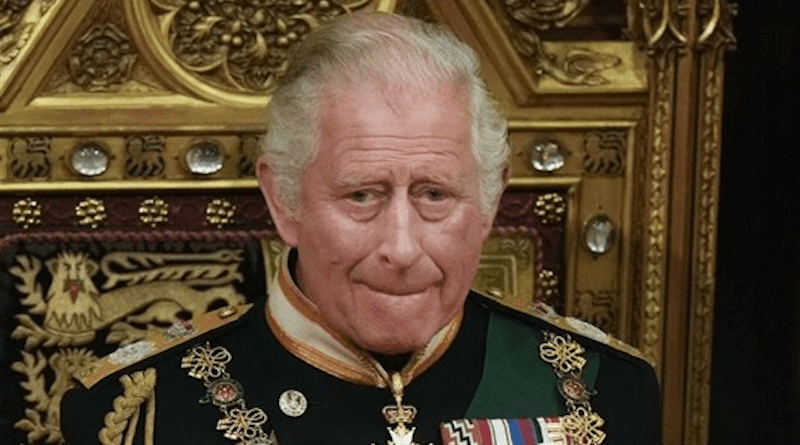King Charles III: A Friend To The Palestinians? – OpEd
By Tom Gomez
King Charles III has always been friendly toward the Muslim world, as seen from his various trips to countries such as Palestine, Jordan, Kuwait, Saudi Arabia, Qatar, and the United Arab Emirates (UAE). Before his trip to the region in 2015, Charles made a real effort to learn the Arabic language for six months. He has always been vocal about Middle Eastern heritage since he graduated college, and his devotion to keeping the peace with the Muslim world is as genuine as it gets based on his first overseas tour by any member of the British Royal Family since the COVID-19 pandemic.
During his visits to some Arab countries as prince, Charles honoured his lifelong commitment to building bridges between different faiths and cultures, exercising his fascination with and love of a region with which he has always been deeply engaged. The former prince of Wales was also willing to express his admiration for the work being done in the region on behalf of refugees, many of whom had been displaced by the war in Syria. During his visit to Egypt in 2020, the former prince underlined his commitment to interfaith harmony. He said, “I believe with all my heart that responsible men and women should work to restore mutual respect between religions, and we must do everything in our power to overcome the mistrust that poisons many people’s lives.” Like his mother, Queen Elizabeth II, Charles has always been devoted to promoting interfaith harmony.
During his visit to Palestine in 2020, the former prince of Wales was quoted with his message of support. He said, “It is my dearest wish that the future will bring freedom, justice and equality to all Palestinians”. This message can be seen as a potential hope for support from Charles for the Palestinian cause. However, the Palestinians should not be in a rush to assume that the King’s statements back in 2020 will suggest he will support the Palestinian cause further. Charles has also been very friendly to Israel. He participated in numerous conferences concerning Israel and the Jewish people, as a believer in interfaith harmony.
This suggests to the Palestinians that despite his friendly statements, the new king will not take a strong stance in favour of the Palestinians. Also, the Palestinians are sceptical and are unlikely to expect the king to favour their case either. The Palestinian experience with the crowns dealing with their case has been an utter disappointment. Ever since the Balfour declaration and the British mandate over Palestine, the Palestinians have not trusted the British and its intentions.
For the new king to gain the trust of the Palestinians, he will need to have a stronger stance that would favour their position. However, as King, Charles has pledged to stay out of politics and his role will prevent him from taking sides in conflicts. Thus, the Palestinians who require a strong stance of support, will not receive it, and thus will not trust the new King to favour their cause.
This in short suggests that as far as the Palestinians are concerned, there is nothing new under the sun. Whilst Charles has issued statements in favour of the Palestinians in the past, he has done the same for the Israelis as well. Moreover, with his restricted role, he cannot make real influence due to his a-political role as monarch. Thus, the Palestinians will not place high hopes for improvements to their cause, with the inauguration of King Charles III.
As Charles fills in his mother’s shoes as Supreme Governor of the Church of England and the title Defender of the Faith — and, like her before him, he has always made clear that he sees this role as being better defined as a defender of all faiths. In an interview with BBC in 2015, Charles said: “It has always seemed to me that, while at the same time being Defender of the Faith, you can also be the protector of faiths. The Church has a duty to protect the free practice of all faiths in this country.”
Nonetheless, King Charles III’s pronouncements with the Palestinians should be deemed important. Despite limitations to the King’s power, by looking at the former prince of Wales earlier statements and acts towards Arab states during his previous tours, his support for the peace is a welcoming position that the Palestinians will take, although it is not enough to avoid their current geopolitical situation.
Tom Gomez is a London-based political analyst looking at the Middle East.

